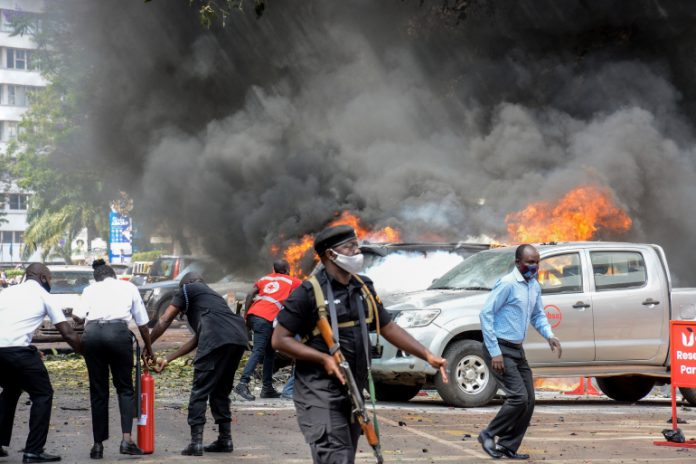Two explosions have reportedly rocked Uganda’s capital, Kampala, on Tuesday, killing at least three civilians in what the police described as a coordinated attack by extremists opposed to the government.
The police disclosed that three suicide bombers also died in the blasts.
“The bomb threats are still active, especially from suicide attackers,” police spokesman Fred Enanga said, blaming the blasts on the Allied Democratic Forces, an extremist group that is affiliated to the Islamic State group.
The IS group claimed responsibility for the blasts, according to SITE, which tracks the online activities of extremist organizations.
It was gathered that the twin explosions occurred within three minutes of each other. Both were carried out by attackers carrying explosives. A possible attack on a third target was foiled by police who pursued and disarmed a suspected suicide bomber, Enanga said.
“We give thanks to God. He has protected us,” said eyewitness Jane Among near one of the blast scenes. “We first heard a blast, and then when we stayed a little we heard another blast and saw dust all over.”
One blast was near a police station and the other on a street near the parliamentary building, according to police and witnesses. The explosion near parliament appeared to hit closer to a building housing an insurance company and the subsequent fire engulfed cars parked outside. Body parts were seen scattered in the street, and later some lawmakers were seen evacuating the parliamentary building nearby.
At least 33 people are being treated at the city’s main public referral hospital, Enanga told reporters. Five are critically injured, he said.
People scampered to leave the city in the aftermath of the attacks, many on passenger motorcycles, as police cordoned wide areas near the blast scenes, footage posted on social media showed.
It was gathered that the Allied Democratic Forces has long been opposed to the long rule of Museveni, a U.S. security ally who was the first African leader to deploy peacekeepers in Somalia to protect the federal government from the extremist group al-Shabab. In retaliation over Uganda’s deployment of troops to Somalia, the group carried out attacks in 2010 that killed at least 70 people who had assembled in public places in Kampala to watch a World Cup soccer game.
But the Allied Democratic Forces, with its local roots, has become a more pressing challenge to Museveni, 77, who has ruled Uganda for 35 years and was reelected to a five-year term in January.
The group was established in the early 1990s by some Ugandan Muslims, who said they had been sidelined by Museveni’s policies. At the time, the rebel group staged deadly terrorist attacks in Ugandan villages as well as in the capital, including a 1998 attack in which 80 students were massacred in a frontier town near the Congo border.











